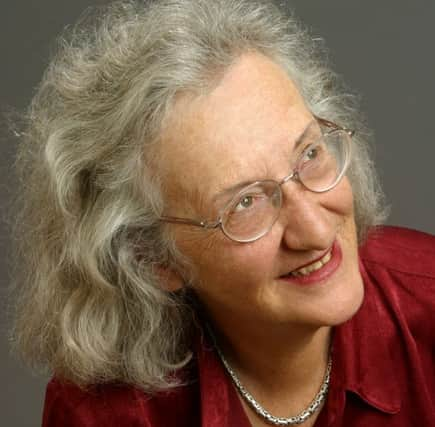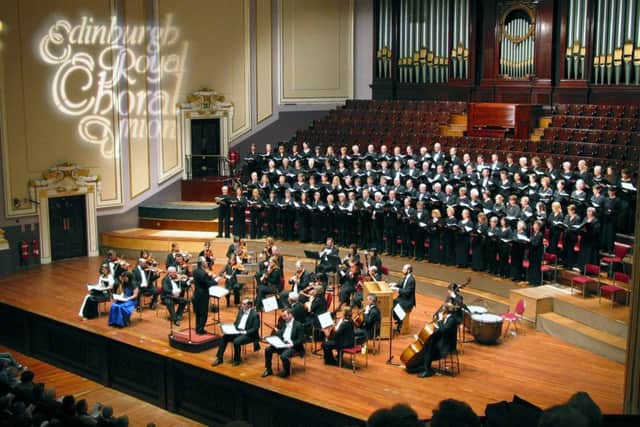Scots composer Thea Musgrave on The Voices of Our Ancestors


At 87, Thea Musgrave has the energy and intellectual sharpness of someone half her age. Speaking via Skype from her New York home, she describes her latest major composition in effervescent language.
Born in Barnton in 1928, and educated at Edinburgh University and with Nadia Boulanger in Paris, Musgrave has long been regarded as one of that pioneering generation of 20th century Scottish composers, alongside Thomas Wilson and Iain Hamilton, who kick-started a much-needed musical Renaissance in Scotland, paving the way for an identifiable lineage of later composers, from Edward McGuire and William Sweeney to James MacMillan.
Advertisement
Hide AdShe has outlived most of her own generation, spent most of her life in the USA with her American violist husband Paul Mark, and continues to add to a considerable canon of work that includes six major operas. Tomorrow night, one of her most her most recent works, The Voices of Our Ancestors, will be given its Scottish premiere in Greyfriars Kirk, Edinburgh, by the Edinburgh Royal Choral Union (ERCU), who jointly commissioned it with the John Armitage Memorial Trust (JAM).


It’s a 40-minute work for chorus, soloists, brass quintet and organ, which draws on ancient texts from a variety of linguistic sources: Latin, Greek, Egyptian, Hebrew, Chinese and Persian among others, all translated into English and set in a dramatic sequence that moves from darkness into the most dazzling Bacchanalian light, expressed in words taken from an Egyptian papyrus that say: “Enjoy thyself more than thou hast ever done before; and let not thy heart pine for lack of pleasure’.”
Musgrave quotes these words with girlish glee, but it was the deeper existentialism of the opening poem – ‘The Creation Hymn’ from the Rigveda, an ancient Indian collection of Sanskrit Hymns first written down around 1600BC – that got her hooked on the idea of exploring ancient writings on “love, loss and drinking”.
“The moment I read it, I knew I had to set it,” she explains. “It’s a poem about existence, of which there are lots throughout the world in very different languages. But what grabbed me here was its last line: ‘only he who is above understands all this… or perhaps he does not!’ I thought it was so extraordinary that people should be asking this question so long ago. It just made me feel, although I can’t talk to my ancestors, that I can listen to what they maybe have to say through this poem.”
So when the people at JAM got in touch with Musgrave to offer her the commission, she knew exactly what it was going to be about. But the urgent thing was to find other poems to put with it. “I started exploring on the internet, and at the public library here in New York, and in all the books of poetry I have up here on my desk. I have a frightening number of poetry books.”
The resulting work, premiered in London in July, turned out to be much more than a standard choral work. “I had this crazy idea that the conductor should come on first, not last – I thought that would appeal to some conductors – and that he would summon the forces gradually.” Those who know Musgrave’s style, and her long-held tendency to write dramatised music in which instruments often become characters and players become actors, will not be surprised by this touch of theatricality.
Advertisement
Hide AdThe prospect of a church setting – St Bride’s, Fleet Street – for the London premiere sent her theatrical mind into overdrive. “I didn’t know the building at the time, but I assumed people would be singing in front of an altar, that kind of arrangement.”
Her idea was that the chorus would start singing at the very back of the church, gradually coming forward to form a semi-circle round the conductor. “But even when the chorus moves up, a semi-chorus is left behind, along with the tenor soloist,” she explains. Even the brass would enter gradually. “When I came to London last year for Total Immersion [a BBC celebration of Musgrave’s career at the Barbican] I met with the conductor Nicholas Cleobury and the JAM people, and told them about my crazy idea. They were thrilled. ‘It’s just the sort of thing we like at JAM’, they said.”
Advertisement
Hide AdOne area of composition Musgrave was unfamiliar with was writing for organ. “But I was lucky enough to know a guy at the University of Southern California who has an organ in his house, and beside it a computer where he can find the sounds of organs from all over the world and play them on his,” she says. He was able to pull up the St Brides’ sounds for me so I could get an idea of what could be done.”
Tomorrow night, the organ is the Peter Collins instrument in Greyfriars, and the organist – Simon Hogan – is the same one who played for the London premiere, so Musgrave is confident its prominent role in the score is in good hands.
The conductor is Michael Bawtree, director of the ERCU, and he’s joined by Scots-based Brass Lab, four vocal soloists and the Edinburgh Academy Chamber Choir. Also in the programme are Jonathan Dove’s The Far Theatricals of Day and – appropriately for St Cecilia’s Day – Benjamin Britten’s Hymn to St Cecilia.
Musgrave is disappointed she can’t be there. She’s busy at home with more commissions, the nature of which she refuses to reveal. “I’m suspicious that way,” she says. Any sign of her retiring? Hardly. “I just love my work and live life to the full. We’ve only got one shot at it!”